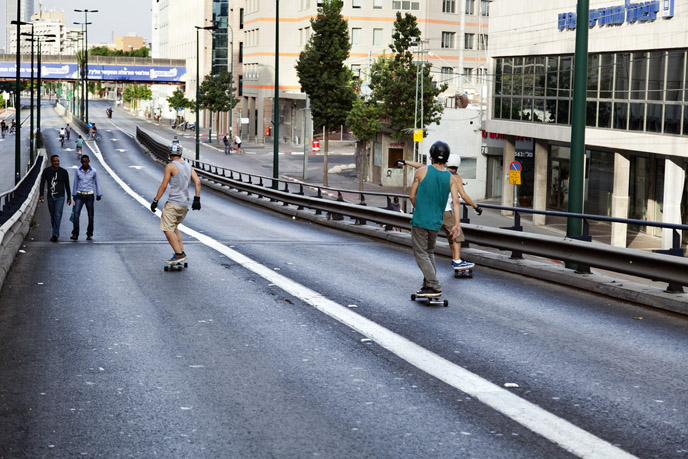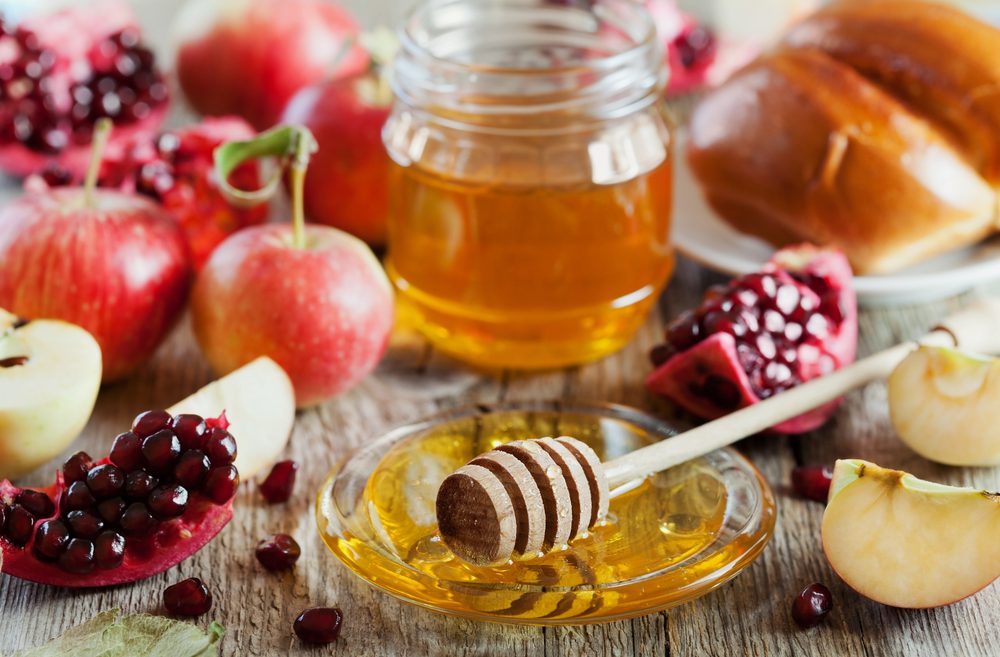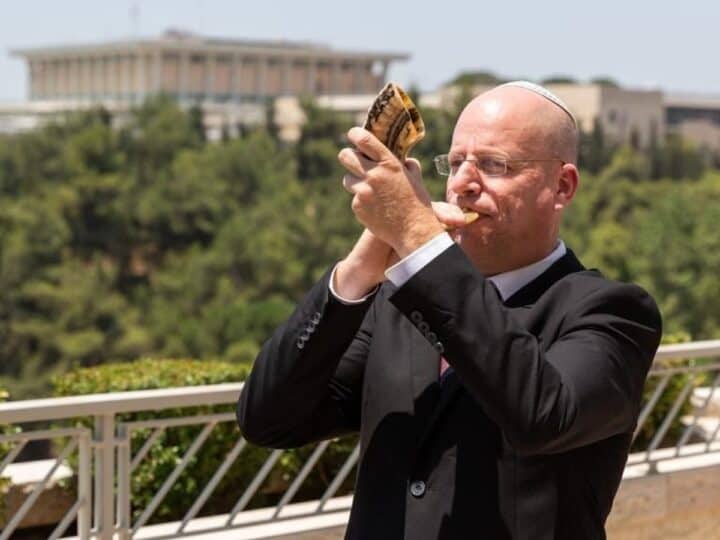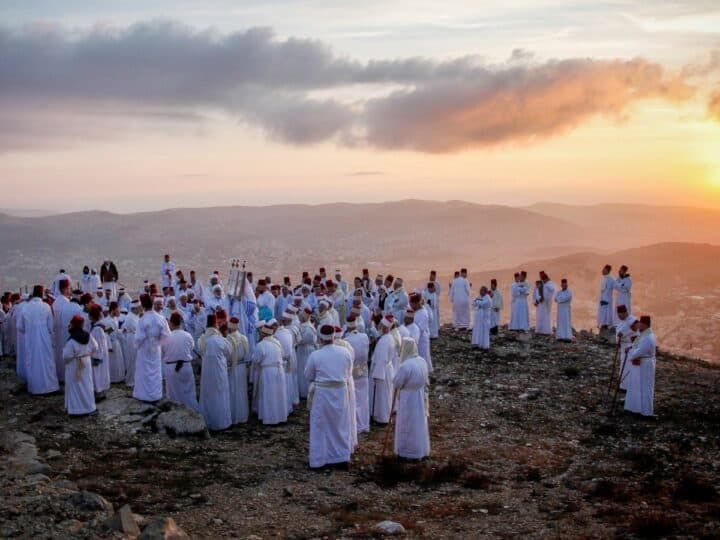Chag sameach! Happy holiday! You’ve survived the hot Israeli summer and now the High Holiday season has arrived.
Here are some fun facts to entertain you and help you navigate the whole thing, because it is A. Whole. Thing. Complete with all the craziness, customs and special little quirks unique to Israel that come with the territory.
- How many days you will have off from work changes each year and depends on the moon
Jewish holidays are set by a lunar calendar, which can be both a bit confusing and awe-inspiring (there’s nothing like looking up at the brilliant super moon perfectly aligned with the harvest holiday and wondering how the heck our ancestors had it all figured out).
Now let’s talk days off: Jewish holidays start at sundown the night before, which often translates to a half day of work on the day leading up to a holiday. Much like on a typical Israeli Friday, there is a hectic rush involved. You must get home, get to your host’s house before the buses stop running, and/or get to the “super” (market) and stand impatiently in line to get the one thing you forgot to buy before the chag.
But you’re never quite sure when it’s all gonna go down, and you’re usually not alone. What time is everyone working until? When will the supermarkets close? When do the kids start their school vacation?
Going with the theme of Israelis doing everything at the last minute, you probably won’t know until you take a personal survey of all your friends and co-workers, compare calendars, and check government websites at least a few times.
And the holidays can also be brutal in their own fun way. Spring 2018 saw holiday after holiday sandwiched between Shabbats and packed one after the other in an unusually short time frame.
As a result, we’re pretty sure that no one got anything done last year in between runs to the supermarket just as Shabbat let out (when stores open back up), just in time to buy new supplies for the Sunday chag meal, a sport that could only be mastered by Israeli balaboostas.
2. It’s a healthy holiday, and here’s why
Honey and pomegranates are the main symbols of Rosh Hashana in Israel (sorry, apples!) and so are consumed in plenty. Natural bee honey is known to be a healthier sweetener than is refined white sugar.
Pomegranates are said to have the same effect on the cardiovascular system as red wine, which offsets the high fat intake of holiday feasts (thank goodness!).
To be perfectly correct, the “land of milk and honey” reference in the Bible is said to be about date honey, or silan.
This is a time in Israel when dried dates are consumed in high quantities and are sold in pretty boxes as hostess gifts. Dates are as sweet as candy but are a natural and healthy source of energy that doesn’t cause blood sugar to spike.
Additionally, the only edible non-dried date can be found hanging from palm trees around Israel and in markets in the autumn. They are sweet, crunchy, and bright yellow, and most importantly are a much better snack than a Snickers bar.
3. But it’s also a high-carb holiday
Because… holiday challah loaves, kugel, and honey cake, to name just a few offenders.
4. You’re going to hear a shofar or two when you’re trying to watch your Netflix
The shofar is an important symbol on Rosh Hashana and Yom Kippur. Its sound has great historical and religious significance. However wondrous, producing a sound from blowing into a ram’s horn takes practice.
Once you’ve got that shellacked ram’s horn right up next to your face in all its smelly glory, you’ve got to purse your lips and spit into it like you would when playing a trumpet.
It’s not exactly pretty when your face goes red without so much as having made a peep out its flouted end. That explains why your neighbor one floor below is practicing every night after dinner, long before the holidays begin.
5. Come late October you’ll see sukkahs everywhere, even after Sukkot
Visit restaurants, hotels, houses, or even just pass by an apartment with balconies in mid- to late October, and you will see sukkahs (outdoor structures with open roofs covered by palm branches) EVERYWHERE.
You can buy the standard kit at the supermarket or hardware store and assemble it yourself wherever you can find a quiet outdoor space near your home. Meals are traditionally eaten in the sukkah during the week of Sukkot, and it is a blessing to invite guests to join you there.
Some Israeli establishments such as the Waldorf Astoria hotel in Jerusalem take months to plan their perfect sukkah (they also take three whole weeks to assemble the masterpiece in which their guests dine!).
It’s seemingly all good when it goes up, but there is one caveat: Taking down the sukkah following the holiday is the equivalent of taking down the Christmas lights in other parts of the world — it can take a hot minute, especially since the holiday falls at the tail end of the High Holiday season when everyone is utterly exhausted from all the hoopla.
Consequently, you may see those puppies up until the November rains hit, when you’ll see people frantically disassembling.
6. Yom Kippur is the greenest day of the year
Because Yom Kippur is a day when driving is more than just a little frowned upon, even secular Israelis abstain from starting an engine on this one day a year. But that doesn’t mean that you won’t see anyone out and about.

Israelis who aren’t in synagogue typically take to the otherwise deserted streets on this day to walk or ride bikes in the middle of the road (or even lie down on the highway). Emergency vehicles do pass through from time to time, so the latter activity isn’t highly recommended.
This strange spectacle can feel like more of a bizarre street party than a somber fasting holiday. At least Israel’s carbon emissions are nearly non-existent for a day!
7. Fast until you want to pass out, then stuff yourself silly
For many Israelis, Yom Kippur means 25 hours without food or water—yikes! And most times, this holiday falls before the Israeli summer heat has completely faded, which can be an added challenge.
But that’s not the strangest part of this holiday. As with all Jews around the world, once the Yom Kippur fast breaks, all bets are off. Pass the bagels and the pickled herring, or we will pry it out of your cold dead hands. Sorry, not eating has made us crabby, and we will make up for those lost meals if it’s the last thing we do!
8. Citrus, more specifically etrog, becomes a prized possession –if only for a week.
The etrog (citron) is one of the four species along with date palm branches (lulav), myrtle (hadas) and willow (arava) used to commemorate the Sukkot holiday.
While no one would ever buy this rare citrus fruit 11 months of the year, come Sukkot it’s a prized possession. According to the Israeli Ministry of Agriculture, 1 million etrogs are produced in Israel each year, 85% of which are exported to Jews abroad (etrogs found in Israel are also imported from Italy and Morocco).
Some people pay an arm and a leg for a seemingly “perfect” one, and they are packed in boxes that are padded with cotton or foam, much like that bracelet you bought your girlfriend for Hanukkah.
What’s done with all the tons of etrogs sitting on the counter after the holiday passes? Some people make them into jam, but others, like Julius craft distillery, make it into a unique spirit. We suggest giving it a swig!
9. Erratic store hours and traffic jams
Between Rosh Hashana, Yom Kippur and the week-long holiday of Sukkot (the middle of which is a holiday when transportation is not restricted), you just never know what’s going to be closed and what’s going to be open.
Supermarkets might be out of chicken for a few days at a time, and business owners might be vacationing in Crete.Also, getting around will inevitably be more trouble than it’s worth, as millions of Israelis set out to national parks and museums during the intermediate days of Sukkot. Oy vey.
10. The “after the chagim” phenomenon
This is a time of year when no one in Israel gets anything done. At work and in school, things grind to a halt.
It’s a sacred time even for secular Jews, who spend time with their family and enjoy celebratory meals. The odd day here and there that are school or work days in between the madness are usually not enough to get into anything heavy, and so things are pushed aside until after the chagim.
This phrase is also a popular way to shelve requests or inquiries indefinitely. “After the chagim” might just mean you’ll never get an answer regarding whatever it is you are seeking, unless you become a real nudnik (nag).
11. The pre-holiday supermarket can be a war zone…
Or it can be a place to connect with savtas (grandmas) of all backgrounds and crowdsource some great cooking advice!
Supermarkets are typically jam-packed pre-holiday, then abruptly closed, then out of meat following the chag, and it’s because nearly the entire country is doing their holiday shopping all at once.
Adjusting your expectations (schedule extra time to wait in line) can help, but you can make all the bustle work to your advantage.
Look at it as a fun opportunity toget advice (solicited or not) on, for example, how to make gefilte fish from the Arab fish monger grinding your fish, orfrom the Polish grandma behind you who yells “No! Don’t get it with the bones!” Or eaves drop on the Iraqi woman in line who’s describing how to make her famous kubbe. Note to self: Bring notebook.
On the other hand, all this craziness may be one reason why Shufersal, Israel’s largest supermarket chain, now gets 12 percent of its $3 billion in annual revenue from customers who choose to shop online and have their groceries delivered to the door.
12. But at least the prices are good, and ooh, presents!
Rosh Hashana is a time of year to buy presents for family and hosts, so if you need a new pot, baking dish or tablecloth, or you just want to stock up on Israeli wine and chocolates, it’s best to wait until the High Holiday season.
Contrary to how things work in many other places, the items you’ll need for the chag actually go on sale ahead of the holiday (the opposite concept of 50% off Halloween candy the day after).
And, another fun fact: Israeli employers tend to give their employees grocery giftcards to help lighten the holiday load, because, yeah, groceries are ridiculously expensive here.
13. It’s a time of pilgrimage (and forgiveness) for many
Many Orthodox and traditional Israeli Jews travel to Jerusalem, and more specifically the Western Wall, for the slichot (penitential) prayers that precede Rosh Hashana. These special services begin at midnight and at dawn over the course of several days or weeks.
Some ultra-Orthodox Breslev followers make a pilgrimage at this time of year to Uman, Ukraine, to pray at the tomb of their great Rebbi Nachman.
This awe-inspiring time is also one of repentance and forgiveness, so don’t be shocked if your neighbor comes up to you out of the blue to apologize for scratching your car that one time. It’s probably been on their mind for a while, and now they can start the new year with a clean slate.
14. But most of all,it’s a time for toasts
If you’ve been invited by your boss to the conference room for a toast (haramat kosit) you can be sure it’s in honor of the new year. It’s probably the one time where you’ll be encouraged to drink wine during office hours (probably out ofplastic cups, no less) so enjoy it! Also, there’s usually honey cake involved, which is always a good thing.
Get used to hearing and saying chag sameach (happy holiday) to everyone you interact with for the next month or so. Just don’t say it on Yom Kippur, where instead you should wish someone an easy fast (tzom kal), or g’mar chatima tova (that their name will be signed in the good book). And don’t forget to spread the joy at home too, among family and friends!
Even in the age of smartphones and WhatsApp, Israelis are notoriously old school about holidays, calling family and friends individually to wish them a happy holiday before the sun sets, so make sure your cellphone is charged!
















